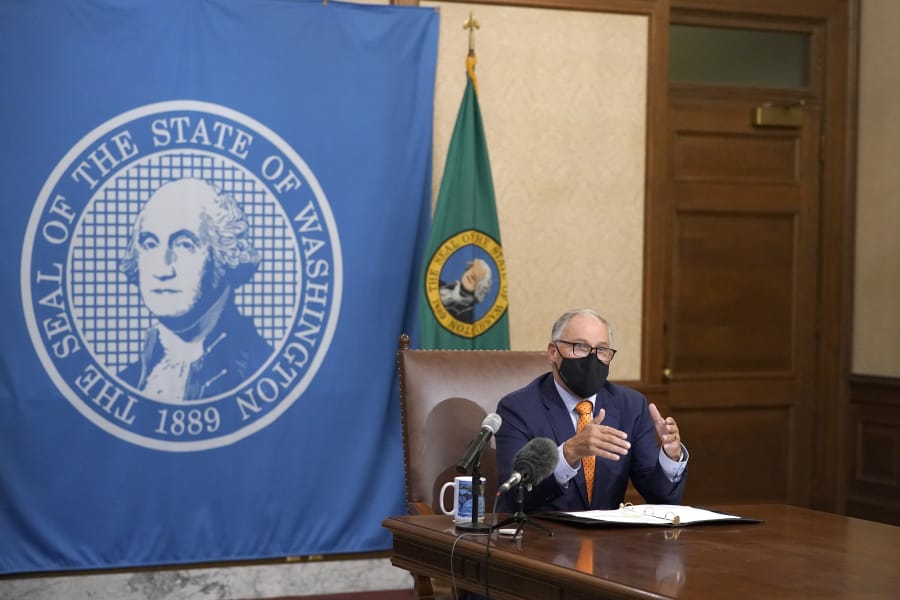OLYMPIA — Washington Gov. Jay Inslee announced Tuesday that he is extending current restrictions on businesses and social gatherings through Jan. 4 due to a continued spike in new coronavirus cases that is straining the state’s hospital system.
The current set of restrictions that took effect last month — including limiting restaurants and bars to to-go service and outdoor dining — were set to expire Dec. 14 but will now be extended an additional three weeks.
“What we do now literally will be a matter of life and death for many of our citizens,” Inslee said.
The Democratic governor said that while the impending arrival of a COVID-19 vaccine to the state is a reason to have hope, “at the moment, we have to face reality, and the reality is that we are suffering a very dire situation with the pandemic.”
Inslee also announced spending $50 million in federal funds for additional grants for businesses, on top of the $135 million in grants, loans and other assistance he announced two weeks ago to help businesses and workers impacted by the restrictions.
“We know this will not eliminate all of the economic people are suffering,” he said, and said that the state is continuing to press Congress for additional relief.
State Commerce Director Lisa Brown said that the agency has already received 16,000 applications for grants, and thousands more have started the application process. She said that businesses should complete their applications by Dec. 11 in order to be awarded money by the end of the year.
Restaurants were among the businesses forced to close their indoor services, including fitness facilities and gyms, bowling centers, movie theaters, museums, zoos and aquariums. Retail stores — including grocery stores — have had to limit their indoor capacity to 25 percent. Personal services — like hair salons — are currently limited to 25 percent of maximum occupancy and professional services are required to mandate remote work when possible, and when not, to be restricted to 25 percent occupancy.
Indoor social gatherings with people from more than one household are also prohibited unless attendees have either quarantined for 14 days before the gathering or tested negative for COVID-19 and quarantined for seven days.
In an unsigned joint statement, Senate and House Republicans said that the governor “has no idea the anguish and desperation average people are feeling right now.”
“Small-business owners care deeply about their customers and are trying to be safe,” the statement reads. “Instead of unfairly restricting their ability to earn a living, we should be working with them to find ways to reduce the spread of the virus.”
The Washington State Department of Health on Monday announced 6,972 new cases throughout the state, but said that number includes both a backlog of COVID-19 positive lab test results received over the weekend and about 1,800 duplicates that have not yet been resolved.
The high number of cases reported is also due to catching up from a backlog created by temporary system slowdowns last week as servers were upgraded, health officials said. The estimated 1,800 duplicate cases in Monday’s total case counts will be removed from the dataset in the future as the department catches up on that process.
The U.S. has recorded about 15 million confirmed COVID-19 cases and over 284,000 deaths. There have been more than 184,000 cases in Washington state, and 2,941 deaths.
Inslee noted that 80 percent of the state’s intensive care beds are occupied, with nearly 1,000 state residents in intensive care across the state.
“Medical workers are becoming overwhelmed,” he said.
For most, the coronavirus causes mild or moderate symptoms, such as fever and cough that clear up in two to three weeks, although long-term effects are unknown. But for some, it can cause more severe illness, including pneumonia and death.



